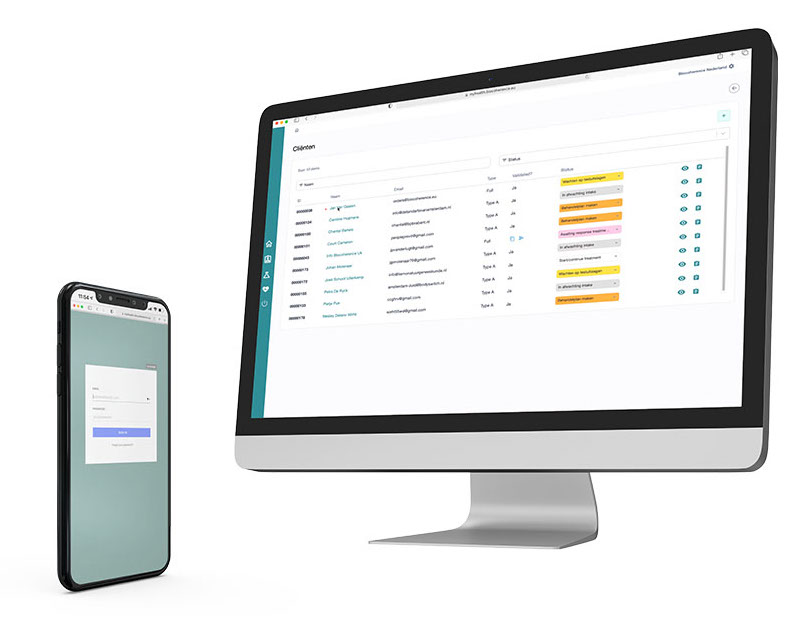Education Module Regulation Diagnose and Biomedical Systems Therapy
By setting up an intake systemically, you increase the effectiveness of the intervention
Become a Certified Biomedical System Therapist!
Biocoherence will organize the training course from January 2025
“Regulation of Diagnostics and Biomedical System Therapy”.
This training course is specifically intended for experienced therapists with a practice and with at least a HBO physiological prior education.
GET A TOTAL VIEW OF A PERSON’S HEALTH
Regulation Diagnostics and Biomedical System Therapy
Therapists with an existing practice learn to work with data obtained from the intake and additional tests to make a good system diagnosis. We work with a scientific system model in which we think in terms of patterns of disruption in the body and not of simple cause-effect relationships that many other orthomolecular therapy courses now work with. Coherence in underlying disturbances in regulatory systems forms the basis of this approach.
Charting the pattern of disruption at the regulatory level is central to the approach, which is why we refer to it as ‘Regulation Diagnostics’. Subsequent treatment is then aimed at restoring, resetting, the pattern of disruption and not at simple cause-effect relationships
After making a proper system diagnosis, you are able to implement interventions, whereby you can use customized solutions in lifestyle, nutrition and sleep hygiene, orthomolecular products, pre- and probiotics, digestive enzymes, phytotherapy and homeopathy. The intervention can be supplemented (possibly in collaboration with other colleagues) with multiple interventions within the same system approach, such as coaching, stress management, psychotherapy and exercise advice.
The education module has been set up for therapists / health professionals who want to work systemically and integrally at a higher scientific level, and are provided with a system model for this. Physiological knowledge at HBO level is necessary for this. All meetings can also be followed as separate modules.

learn to think in patterns of disbalance and cohesion
Chapters en objectives
1. Foundations of systems thinking and basic principles of Biomatrix theory model (BMX)
– Insight into the Development of Systems Thinking
– Knowledge of the Positioning within Systems Thinking (open vs closed, complex dynamic systems)
– Familiarity with Key Terms and Concepts within BMX
2. The concept of disease and stress adaptation within RDBS
– Insight into the disease concept (acute vs chronic)
– Knowledge of stress and adaptation mechanisms (governance by inhibition)
– Familiarity with primary regulatory systems
– Insight into theories of stress and adaptation (Hans Selye, McEwen and Sapolsky)
3. Mitochondrial metabolism and regulatory hierarchy
– Insight into mitochondrial metabolism (Warburg effect, Thomas Seyfried)
– Cell Danger Response (CDR) hypothesis of Naviaux
– Regulatory hierarchy and local reflexes
4. GPD Syndromes, PPD and Pattern Recognition
– Insight into GPD Syndromes (General Pattern of Dysregulation)
– Knowledge about the reconstruction of the Personal Pattern of Dysregulation (PPD)
– Familiarity with the PPD concept and pattern recognition (Signs and Symptoms)
– Insight into Telentropy and Cumulative Telentropy
5. Patterns and physiological axes – behavior, regulation and disturbed processes
– Insight into patterns and sub-patterns
– Knowledge of schema therapy and behavioral aspects
– Knowledge of three major Brain axes and physiological axes (McGilchrist)
– Insight into pattern description and disturbed regulation
6. Diachronic and synchronic assessment and epigenetic imprinting
– Insight into diachronic versus synchronic assessment
– Skills in detecting major stress events
– Knowledge of the Developmental Origins of Health and Disease (DHOaD) hypothesis and epigenetics
-Insight into early childhood and perinatal imprinting and hormonal imprinting (ELS, OXT/VP balance, GABA switch)
– Familiarity with transgenerational and metabolic imprinting
7. Salutogenesis, pathogenesis and bioregulation
– Insight into the ease-dis/ease continuum and Salutogenesis according to Antonovsky
– Comparison between Salutogenesis and Pathogenesis
– Knowledge of disease development over time and the concept of Patholons
– Familiarity with Bioregulation Medicine and the Reckeweg DET model
– Understanding of the synchronous assessment and state of being in PPD
8. System diagnosis and reconstruction of the PPD.
– Insight into System Diagnosis as a reconstruction of the PPD
– Skill in using questionnaires for in-depth analysis
– Knowledge of the HMA Profile as a Trend Pattern Indicator
– Familiarity with Heart Rate Variability (HRV) as a diagnostic tool
9. Extensive diagnostic tests and analysis
– Insight into additional diagnostic tests for Metabolic Syndrome and Sub-patterns. – Familiarity with diagnostic tests for specific physiological sub-patterns
– Knowledge of Iodine loading test and its impact on metabolism
– Familiarity with the vitamin D profile and the VDR approach (Prof. Marshall)
10. Histamine, Thyroid function and signaling substances
– Insight into the role of Histamine within the immune system and as a neurotransmitter (MACS, CDR, VDR (Broda O. Barnes)
– Familiarity with thyroid function and thyroid metabolism
– Knowledge of the gastric acid test and the role of NO in metabolism (Nathan S. Bryan)
11. Application of the MyHealth® Platform and epigenetic Interventions.
– Familiarity with the MyHealth® platform and its objectives
– Practical application of the MyHealth® Platform in clinical practice
– Knowledge of epigenetic modulation as an intervention strategy (HICs, hormesis)
– Strategies for the use, evaluation and follow-up of interventions
12. Integrative Interventions and final evaluation
– Knowledge of orthomolecular approaches (Bravermann, Kharrazian, Carl Pfeiffer, Abraham Hoffer, William Walsh and David Perlmutter)
– Insight into nutrition, gut health and the microbiome
– Familiarity with lifestyle and bioregulation interventions
– Knowledge of phytotherapy and psychophysiology
– Integration and evaluation of acquired knowledge and skills
DETAILS
Date for introduction: Friday November 29, 2024
Locatie: Ampt van Nijkerk
Costs for welcome event: None
Accreditation: is requested from the MBOG, VBAG, NWP and CAT
Extra option: It is not possible to follow the modules separately


